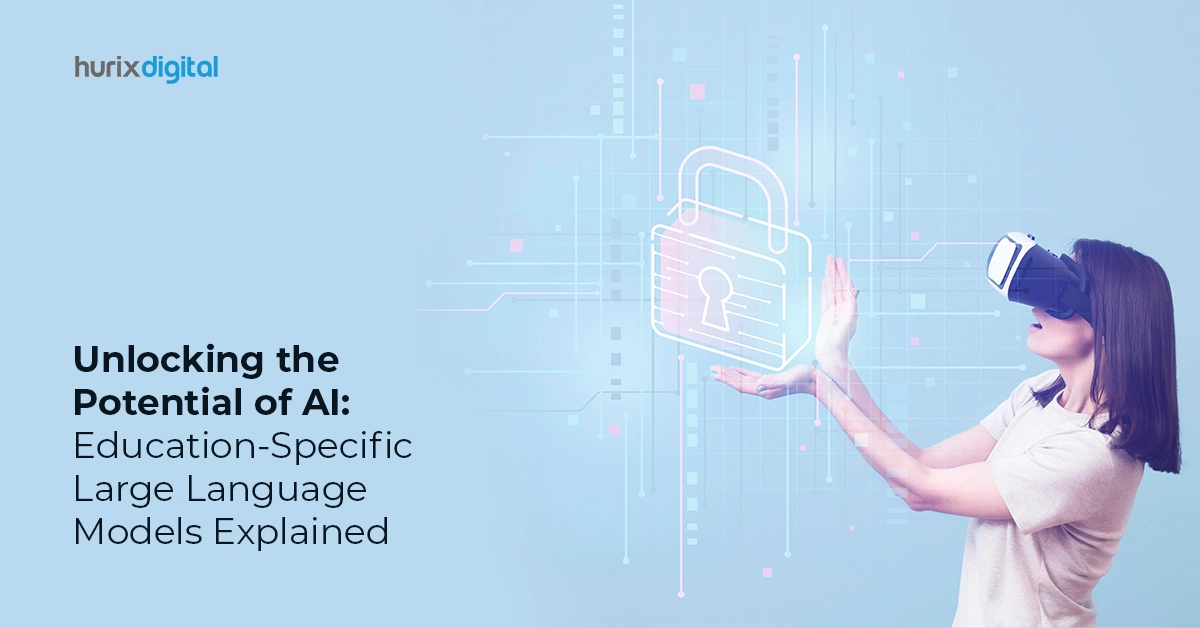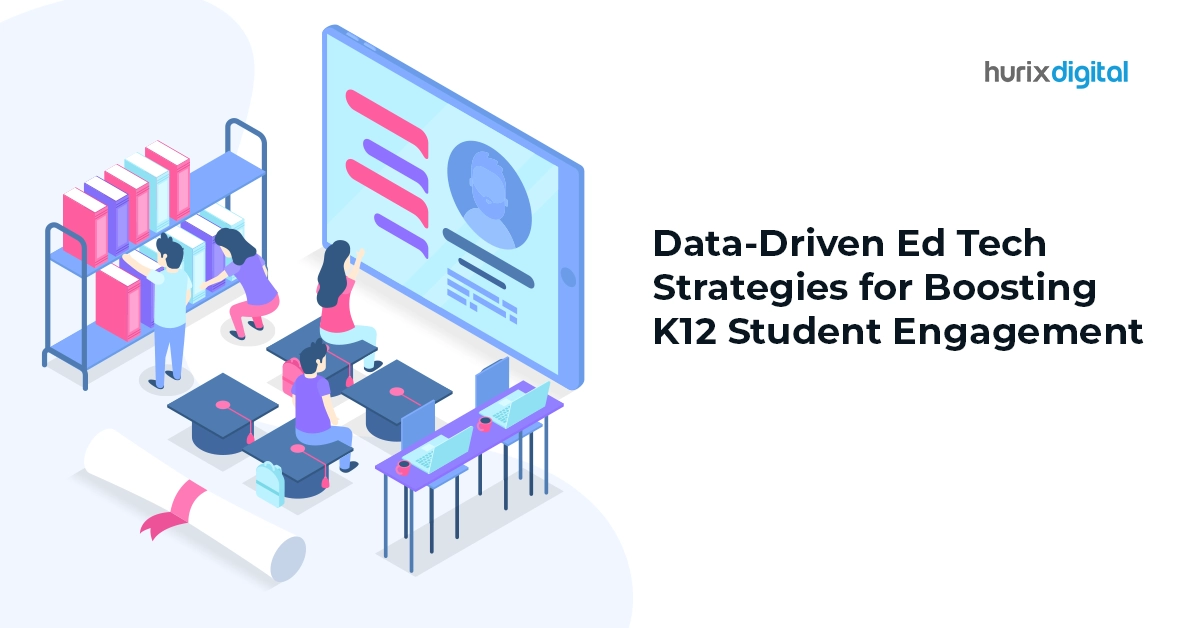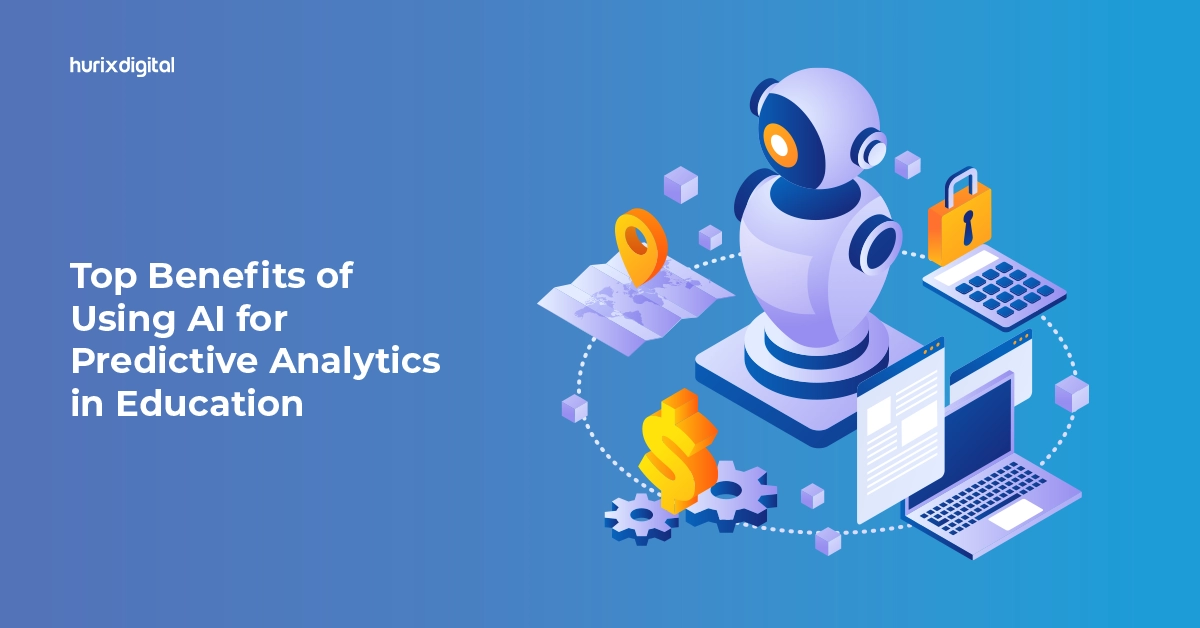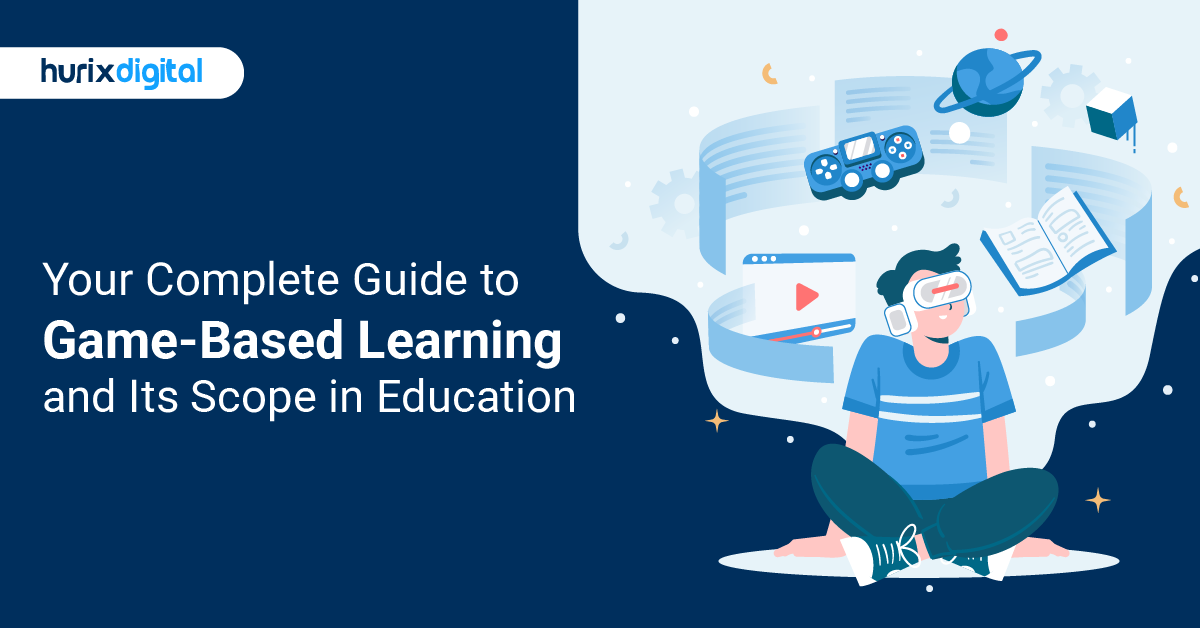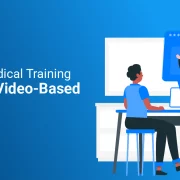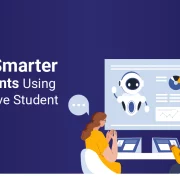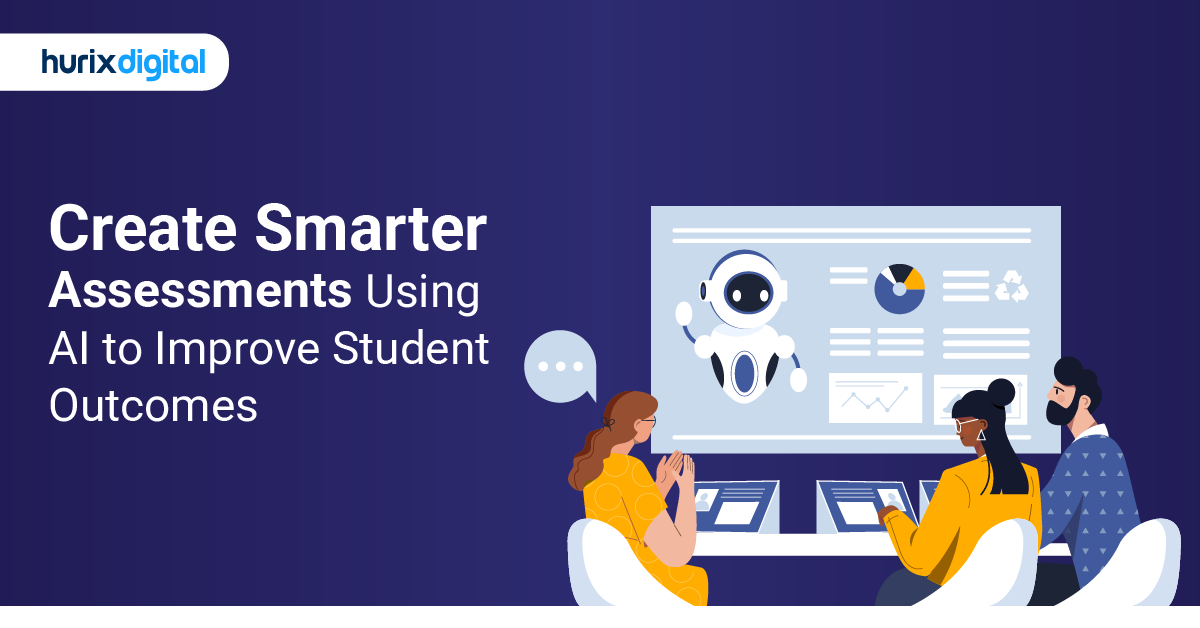
Create Smarter Assessments Using AI to Improve Student Outcomes
Summary
AI is reshaping student assessments by making them smarter, faster, and more effective. This guide explores how AI-driven tools enhance learning outcomes, streamline grading, and optimize assessment services, allowing educators to focus on meaningful student development while ensuring fair and accurate evaluations.
Everyone knows the impact assessments and feedback can have on learners. Assessment plays a vital role in grading students, improving their performance, advancing their knowledge, and motivating them to perform even better.
Artificial intelligence, or AI, is one of the most useful technological tools available. It can generate student-centric assessments to enhance learning outcomes. According to a survey by Forbes in October 2023, more than half of educators believed that AI in learning positively impacts the learning process.
Various forms of assessment, such as formative, summative, peer, and self-assessment, are traditionally used. Using AI in the assessment process can transform the education field.
However, AI-driven assessment is markedly different from traditional assessment methods. This article explores some of the methods for incorporating AI in assessments that can improve students’ learning outcomes.
Table of Contents:
- Artificial Intelligence in Learning and Evaluation
- AI-Powered Assessments
- The Role of AI in Assessment Services
- Benefits of AI-Powered Assessment Tools
- Tips for AI-Driven Assessment Strategies
- Machine Learning for Assessments in Education
- Final Words
Artificial Intelligence in Learning and Evaluation
AI, or artificial intelligence, means the simulation of human thought processes by a computer system. AI finds application in several fields, such as business, healthcare, engineering, banking, education, and many more.
Artificial intelligence in learning and evaluation is the most recent trend in the education technology domain. While AI can have innumerable applications in education, one major field of AI application is designing and implementing student assessments.
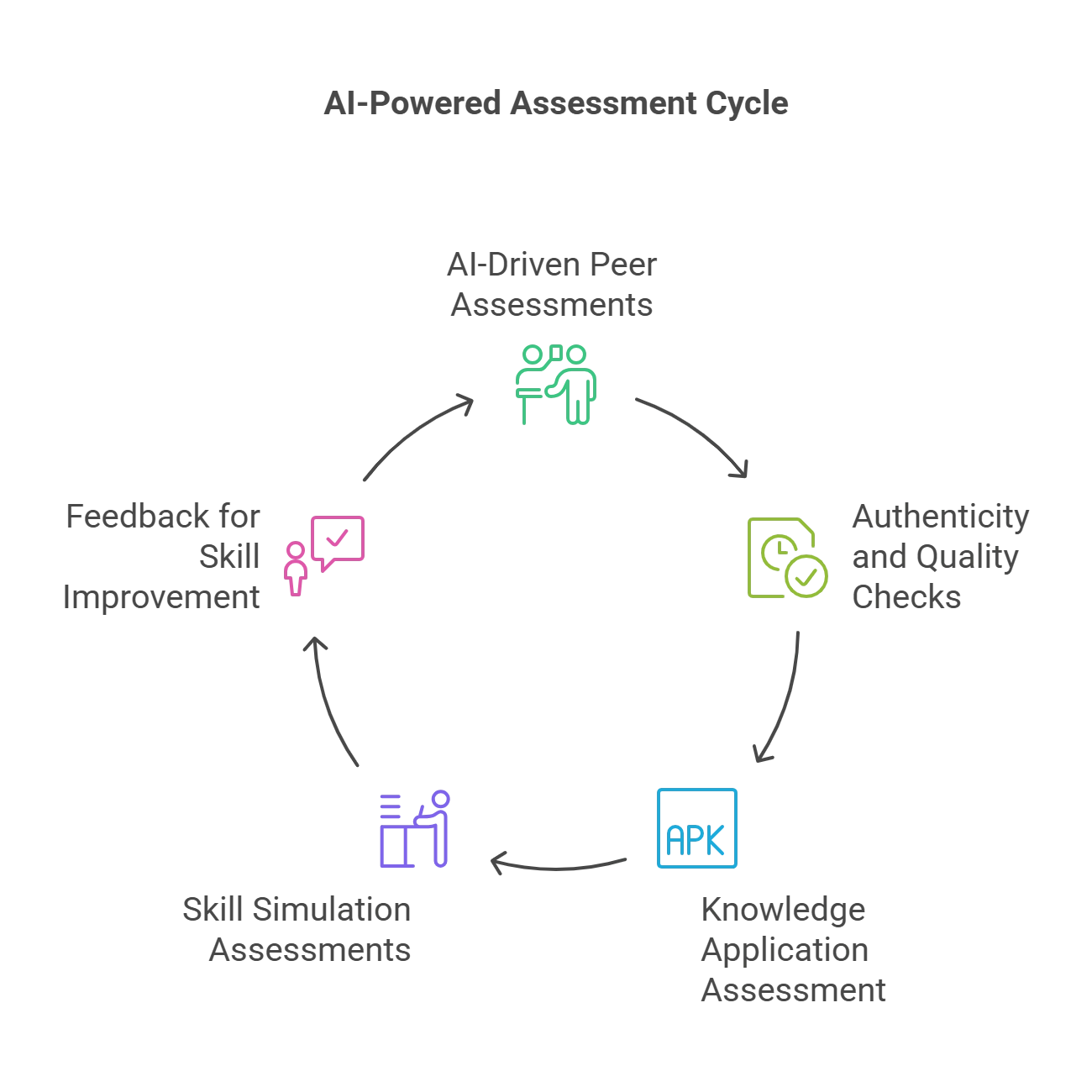
AI-Powered Assessments
AI can generate traditional assessment formats such as analogies, multiple-choice questions, etc. It can also implement precise grading systems for written tasks. With the help of AI, students’ presentations can be evaluated based on diverse benchmarks, including the clarity of the topic, its understanding, and its organization.
AI even enables us to assess human creativity. Creative work like music, art, and design is judged through advanced algorithms by analyzing the harmony and rhythm in the music, colors, and shapes in the designs.
Recently, electronic assessment platforms have enabled the delivery of assignments incorporating multimedia or presenting questions in a predetermined or random order. Such platforms include timestamps throughout the exam and can help capture examinee misdoings.
1. AI-Driven Peer Assessments
Peer assessments are where students judge each other’s work and offer feedback on it. This type of scrutiny has a few drawbacks, which AI can overcome.
For example, as the peers themselves are on the same learning path as the assessee, their feedback may sometimes be unreliable. Using AI-driven assessment tools makes it convenient to ensure the reliability of this type of assessment.
AI algorithms streamline the process and help perceive the feedback provided by the most reliable peer. They also conduct quality checks for the feedback provided, ensuring that it is relevant.
AI also helps match students for peer review based on complementary strengths, weaknesses, and interests.
2. Authenticity and Quality checks using AI
Some AI tools help detect plagiarism in written assignments by reporting if a major chunk of an assignment matches some other source.
Hence, educators can use AI to scrutinize the authenticity of written assignments and judge their quality. They can impress upon the learners to write original assignments, improving their skills.
3. Assessing the Application of Knowledge Using AI to Improve Teaching and Instruction Deficits
The primary end-point of AI in assessments is to understand how the learners grasp the topic and measure their performance. For this, it assesses how the students apply their knowledge in different situations and whether the application is appropriate or not.
Using AI algorithms, these parameters are then analyzed to understand if the learner has comprehended the task correctly. This helps educators identify and rectify any teaching deficits.
AI can analyze a student’s performance to predict which teaching techniques would be most effective for knowledge retention for that specific pupil. Instructors may alter the instructional strategies, enabling students to understand the concept better and improving their learning outcomes.
4. Simulations for Assessing Skills
AI-generated simulations can enhance different education sectors, including medical education, flight training, virtual internships, etc. AI has made acquiring technical or non-technical skills in these fields very easy and has contributed a lot to patients’ and travelers’ safety.
Simulation-based assessments are increasingly used as an assessment tool in healthcare and aviation training. It helps trainees to strengthen their skills, instill better decision-making skills, and improve their performance.
In virtual internships, the learners can get an acute experience of reality by performing actions and tasks that professionals are required to do every day by interning at a fictional company. AI helps them undergo real-time situations and apply their knowledge, preparing them to overcome difficult situations and challenges when they eventually start applying these skills in real life.
5. Feedback as a Tool to Improve Skills
AI offers scores for essays, and some systems even provide a platform for students to practice and improve their writing skills. AI-driven assessment systems provide accurate and personalized feedback for learners’ written assignments.
AI, with its natural language processing models, enables easy analysis of structure, language, and the quality of the assignment. Using personalized feedback provided by AI, the learners can improve their writing quality and structure, thereby increasing their learning outcomes.
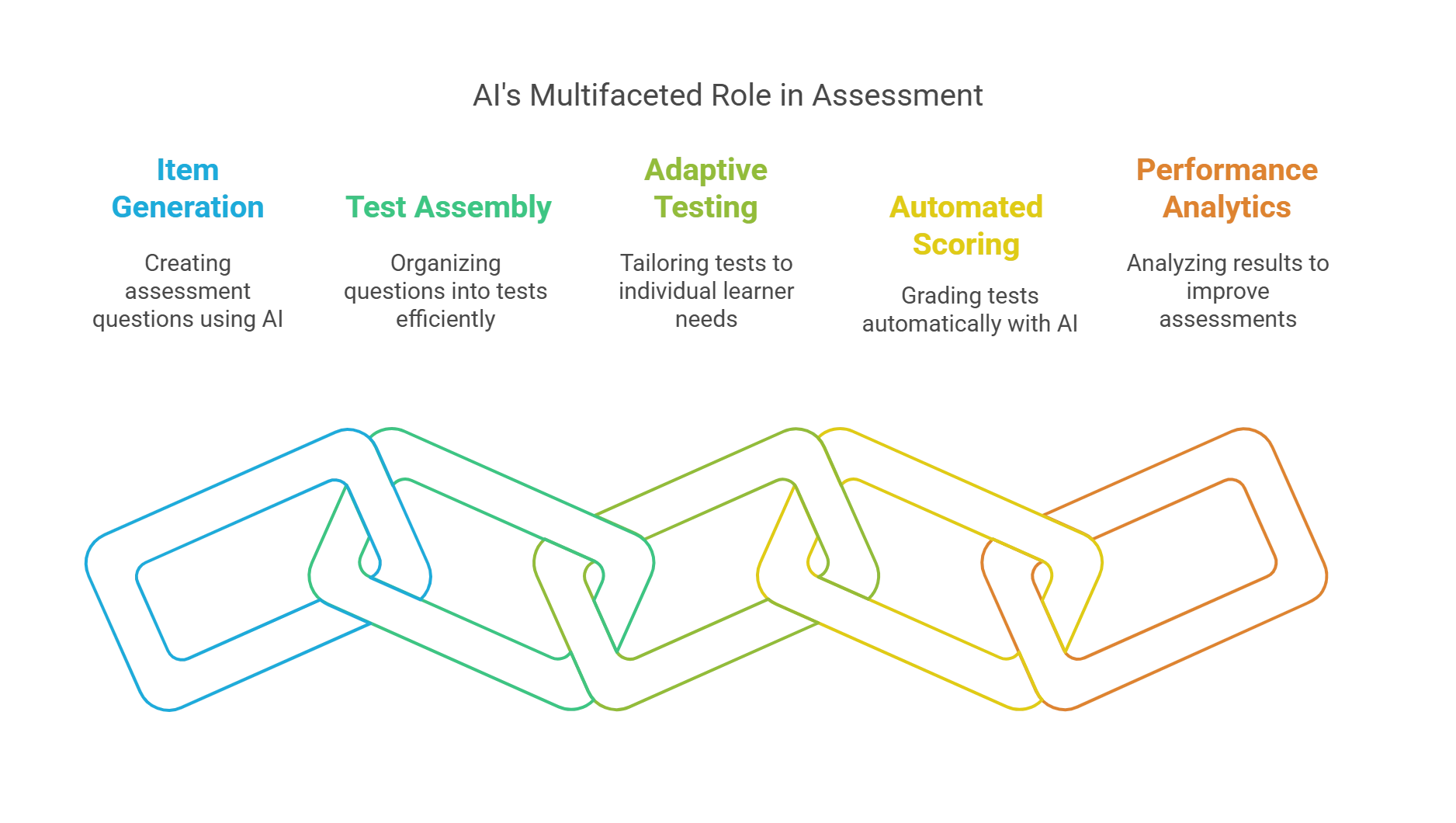
The Role of AI in Assessment Services
The assessment field is changing significantly thanks to AI. Artificial intelligence is making things easier by handling tasks and offering insights based on data, transforming assessment processes.
AI in assessment services can create high-quality questions and offer effective feedback. This shift aims to boost the efficiency, precision, and impact of assessment procedures, ultimately resulting in results for students:
1. Item Generation
AI in assessment services can create a vast pool of assessment items that are aligned with specific learning objectives. This not only enhances the variety of test questions but also helps to reduce bias and save time for educators.
2. Test Assembly
AI-driven assessment strategies optimize the selection and distribution of test items to ensure that assessments are balanced and reliable. This improves the overall quality of tests, ensures content validity, and enhances assessment efficiency.
3. Adaptive Testing
AI adjusts the difficulty of test questions based on a student’s performance, providing a personalized assessment experience. This can increase student motivation, improve item discrimination, and maximize assessment efficiency.
4. Automated Scoring
AI accurately and efficiently scores multiple-choice, essay, and performance-based assessments. This saves educators time, improves scoring consistency, and provides faster feedback to students.
5. Performance Analytics
AI in assessment services fully analyses student performance, from strengths and weaknesses to improvements. This facilitates data-driven instruction, targeted interventions, and personalized learning.
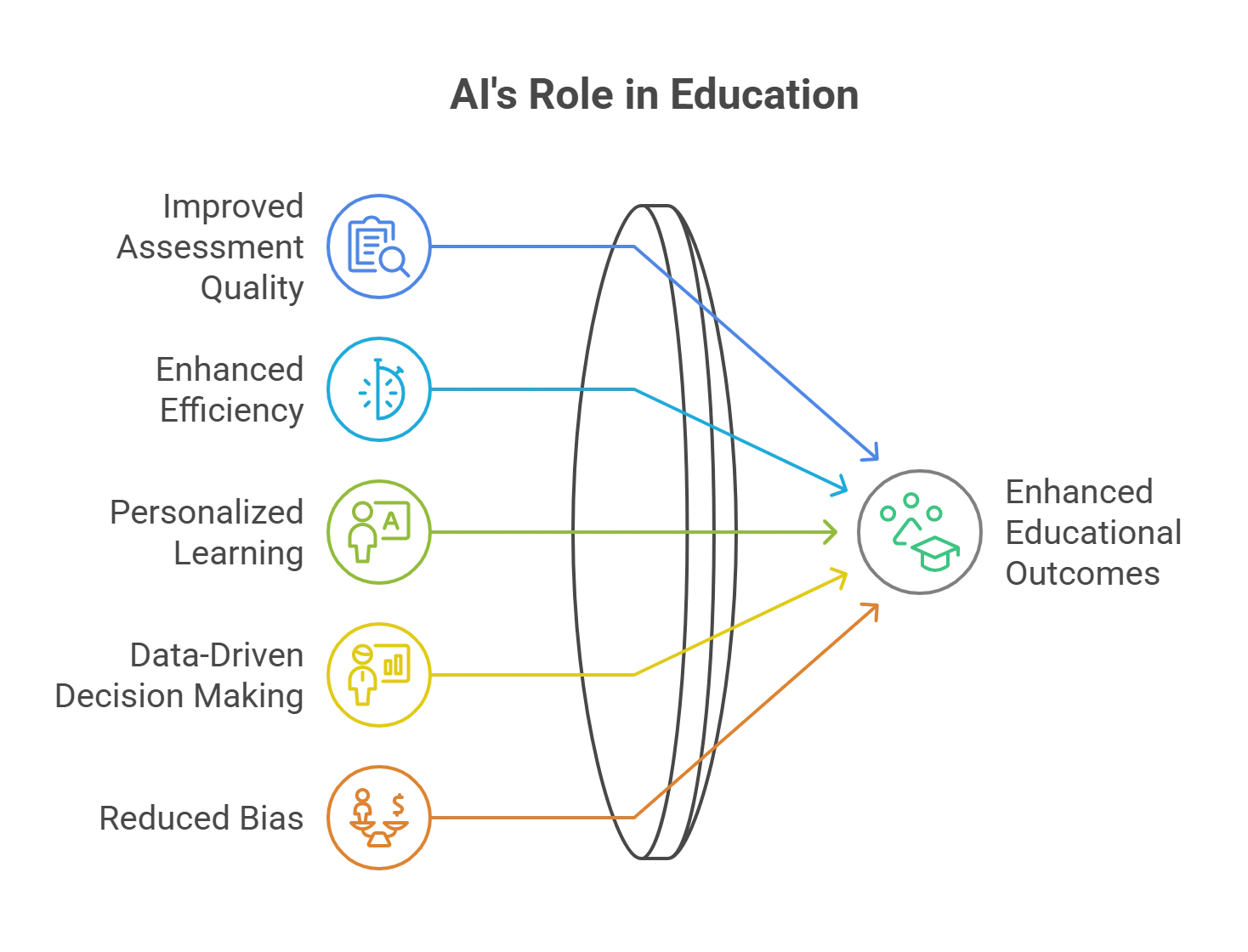
Benefits of AI-Powered Assessment Tools
AI-powered assessments benefit schools and universities by providing real-time feedback on student progress, fueling data-driven decisions, and supporting personalized learning. Moreover, AI can be useful in reducing assessment bias and is thus fair and just toward all learners.
Combining all these advantages, AI in assessment services provides a fair and influential assessment procedure.
1. Improved Assessment Quality
AI creates reliable, valid, and fair assessments by reducing human error, optimizing item selection, and detecting potential bias.
2. Enhanced Efficiency
Automated processes streamline assessment administration and scoring, saving educators valuable time and resources that can be redirected toward student interaction and personalized instruction.
3. Personalized Learning
AI-powered adaptive testing personalizes assessment for every student based on his/her individual needs and abilities to maximize learning gains and provide a more engaging learning environment.
4. Data-Driven Decision Making
AI allows instructors to gain insights into student performance through the analysis of large amounts of data. Educators can use this information to inform instructional practices, identify at-risk students, and develop targeted interventions.
5. Reduced Bias
AI can help reduce bias within assessment questions and scoring by discovering patterns and possible biases within the data. This justifies fairer test procedures for all examinees.
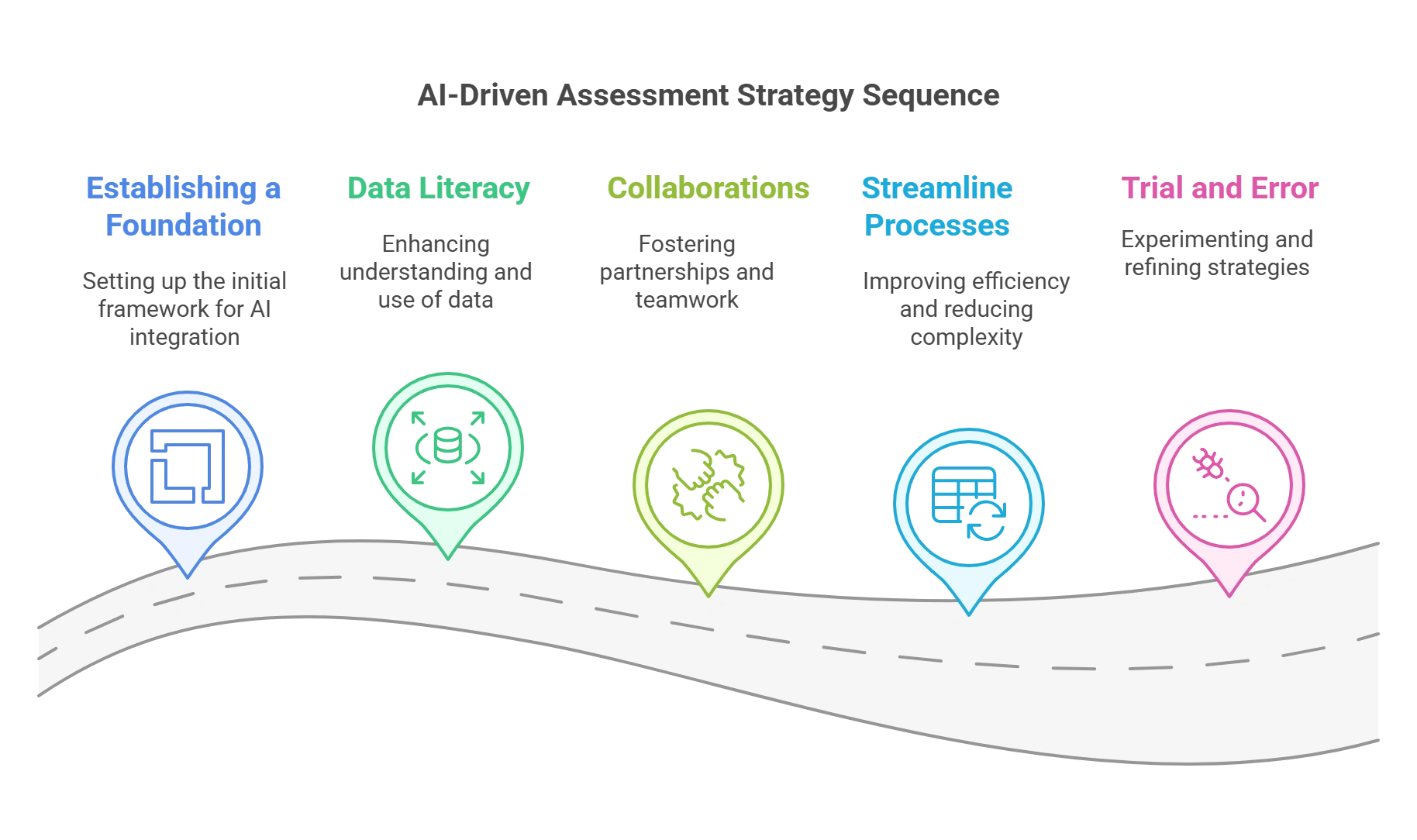
Tips for AI-Driven Assessment Strategies
To use AI effectively, assessment objectives and goals must be stated for successful assessments. This means determining the anticipated outcome, the target audience, and what information to collect. The institution will thus be in a position to determine the kinds of tools needed based on requirements.
1. Establishing a Foundation
This is crucial for supporting AI-driven assessment strategies and involves investing in data storage, processing capabilities, and network infrastructure. Moreover, ensuring compliant data management systems is essential to safeguarding student privacy and maintaining data accuracy.
2. Data Literacy
Promoting a culture of data literacy and proficiency in AI among educators is key to AI integration. This entails offering training programs and development opportunities to equip educators with the skills needed to comprehend, analyze, and apply AI insights.
3. Collaborations
Collaborating with organizations or consultants who have expertise in AI can expedite optimizing assessments with AI. These specialists can offer advice and assistance and access to state-of-the-art technologies and industry best practices.
4. Streamline Processes
Deploying AI in assessment services gradually through pilot programs enables adoption, evaluation, and improvement over time.
5. Trial and Error
By initiating small-scale trials before expanding the deployment, educational institutions can evaluate the efficiency of AI tools, recognize obstacles, and make tweaks. This step-by-step approach guarantees enhancements and fine-tuning of AI-driven evaluations.
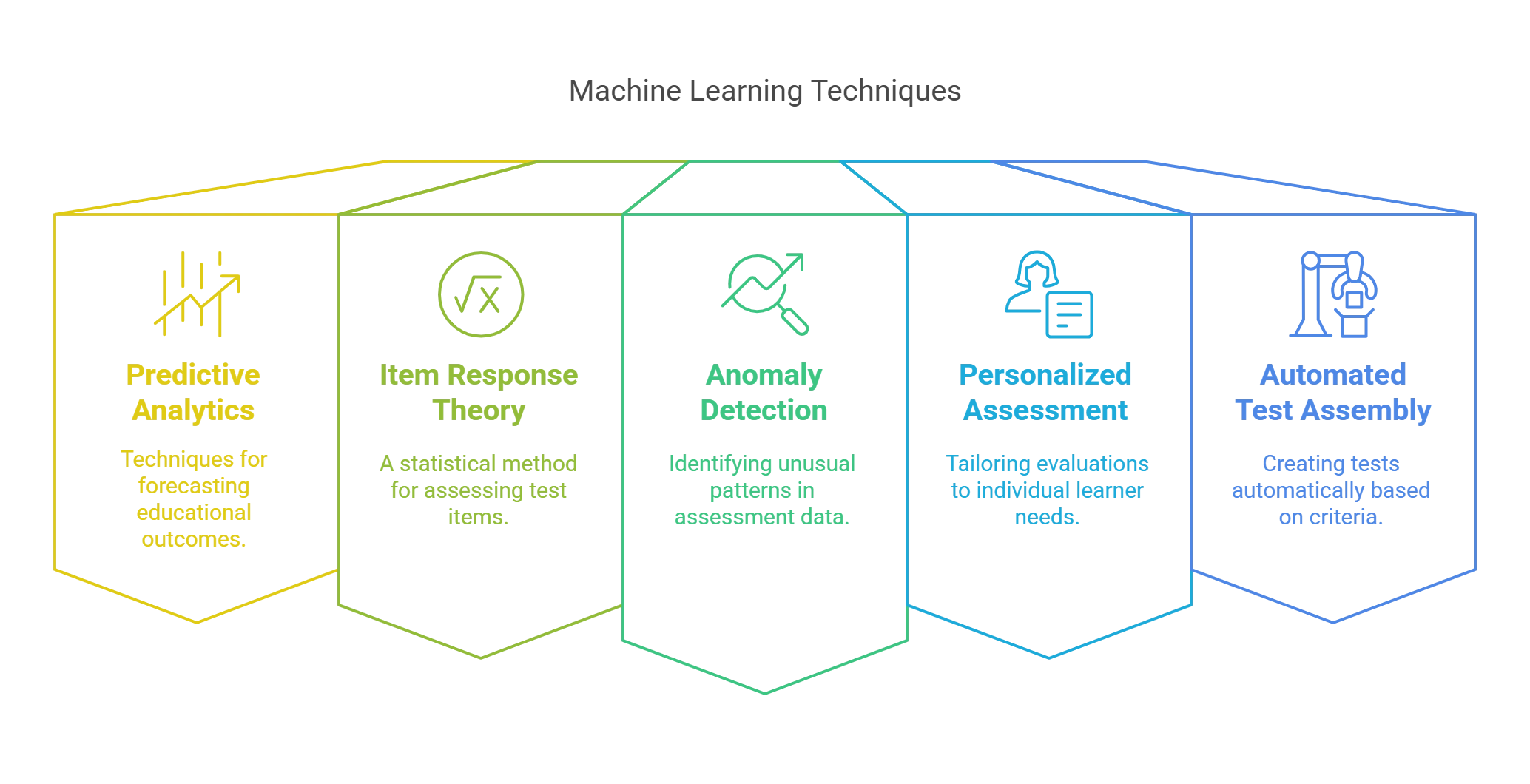
Machine Learning for Assessments in Education
Machine learning for educational assessments is at the heart of AI and, hence, at the core of any AI assessment optimization. The algorithms review large datasets, informing the assessment decisions by recognizing patterns, trends, and relationships.
Some of these key applications include:
1. Predictive Analytics
By training on historical student performance data combined with demographic and other relevant factors, ML algorithms yield predictions of future outcomes for students. In this way, educators can identify at-risk students and apply focused interventions.
2. Item Response Theory (IRT)
This statistical model estimates the test-taker’s abilities and the difficulty of test items. ML can enhance IRT by processing large datasets to improve these estimates, leading to more accurate and precise assessments.
3. Anomaly Detection
The application of ML algorithms recognizes uncommon patterns in assessment data, which may indicate potential cheating or other irregularities. This helps maintain assessment integrity and ensures fair evaluation.
4. Personalized Assessment
ML can recommend tailored assessments or learning paths by analyzing individual student performance data. This fosters a more personalized learning experience and maximizes student engagement.
5. Automated Test Assembly
ML can optimize the creation of assessments by selecting items that best align with learning objectives and ensuring appropriate difficulty levels. This saves educators time and improves test quality.
Final Words
Machine learning and AI in assessment services have revolutionized the field, offering opportunities to improve student learning and results. By utilizing these technologies and implementing approaches, educational assessments can elevate their services and effectively promote excellence.
Technology is rapidly changing daily. A report from the World Economic Forum concludes that artificial intelligence (AI) in education is increasingly being implemented and predicts that this market will reach 21 billion dollars by 2028.
At Hurix Digital, AI and machine learning are integrated into assessments, assisting managers in educational program development with data-informed choices that enhance student outcomes.
Feel free to schedule a consultation call today.

Senior Vice President
A Business Development professional with >20 years of experience with strong capability to sell new solutions and develop new markets from scratch. New Market Entry Specialist with experience of working in two of the largest emerging markets – China & India. Also covered other key markets in APAC, US, EU & ME. Exceptional experience of conceptualizing, ideating and selling new learning technologies like VR AR, etc. across multiple industry verticals.
